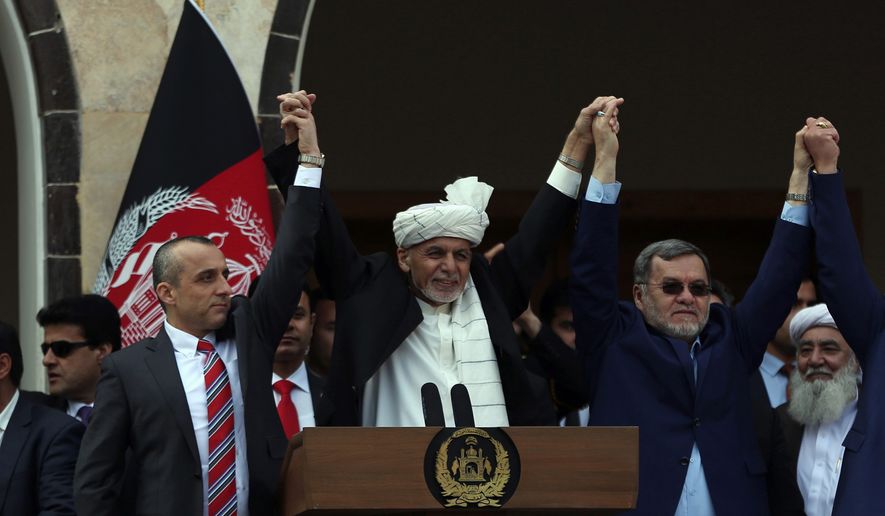It was the very definition of divided government — Afghan President Ashraf Ghani and his top rival, Abdullah Abdullah, staged rival inauguration ceremonies a day before the U.S.-backed Kabul government is supposed to set down for peace talks with the insurgent Taliban movement.
The dueling inaugurations — both men claim they won the country’s September election — mark the latest political crisis for Afghanistan, which is facing a resurgent Taliban movement and an administration in Washington that is more focused on bringing home U.S. troops.
Mr. Ghani, whose ceremony was briefly interrupted by a string of explosions, scored a win on the optics front: His inauguration aired on state TV and was attended by President Trump’s lead peace envoy Zalmay Khalilzad and Gen. Austin S. Miller, the head of U.S. forces in Afghanistan.
Even though the troubled peace talks have yet to even begin, American troops began departures from Afghanistan as part of the deal, marking the first phase of the plan to bring the number of troops stationed in the country from roughly 13,000 to about 8,600.
“In accordance with the U.S.-Islamic Republic of Afghanistan Joint Declaration and the U.S.-Taliban Agreement, U.S. Forces Afghanistan has begun its conditions-based reduction of forces to 8,600 over 135 days,” Pentagon spokesperson Col. Sonny Leggett, said in a statement.
Col. Leggett insisted that the U.S. mission in Afghanistan “maintains all the military means and authorities to accomplish our objectives — including conducting counterterrorism operations against al Qaeda and [Islamic State] and providing support to the Afghan National Defense and Security Forces.”
Many in Kabul openly doubt the American assurances, but the drawdown fulfills a major foreign policy promise of President Trump, who has vowed to end “endless wars” in the Middle East and bring American troops home after nearly two decades of fighting in Afghanistan.
The U.S.-Taliban deal reached in Doha on Feb. 29 called for a comprehensive nationwide cease-fire to be negotiated through the impending intra-Afghan talks, which are slated to begin on Tuesday in Oslo, Norway.
But the accord has already hit some potholes — the Taliban now says the cease-fire only applied to American forces, not Afghan Security Forces, while the Ghani government has balked at reciprocal prisoner releases called for in the Doha deal.
“We signed an agreement with the Americans. But our jihad is not over,” Taliban spokesman Zabihullah Mujahid told Foreign Policy.
“The stooges who supported the invaders during the last two decades are our enemies. This might change after additional talks but at the moment, we are still at war.”
Military analysts also warn that Taliban commanders might be difficult to control and that violent attacks are likely to seek to undermine the looming diplomatic process. Last week, a daring attack in the heart of Kabul claimed by Islamic State killed more than 30 people.
“I think it will be virtually impossible during the negotiation phase to control violence,” Seth Jones, a senior adviser to the International Security Program at the Center for Strategic and International Studies, said of the intra-Afghan negotiations.
“I fully expect both the Afghan government at the top levels to be pushing for military operations, as well as the Taliban side to push for military operations. … You will have both negotiations and violence happening at the same time,” he continued.
The Ghani-Abdullah power struggle only makes the hopes of a durable peace deal even more faint, he said.
“It’s hard to see how serious intra-Afghan negotiations can happen if there is not even an agreement among the Afghans about who is the government,” Mr. Jones explained.
Mr. Ghani said he will announce his negotiating team Tuesday, though it appears Mr. Abdullah may also announce his own negotiating team, the Associated Press reported
• This article was based in part on wire service reports.
• Lauren Toms can be reached at lmeier@washingtontimes.com.




Please read our comment policy before commenting.